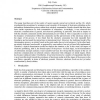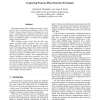97 search results - page 3 / 20 » Are refactorings less error-prone than other changes |
BMCBI
2011
12 years 9 months ago
2011
Background: Comparison of the human genome with other primates offers the opportunity to detect evolutionary events that created the diverse phenotypes among the primate species. ...
GECCO
2009
Springer
13 years 12 months ago
2009
Springer
In this paper, we rigorously analyse how the magnitude and frequency of change may affect the performance of the algorithm (1+1) EAdyn on a set of artificially designed pseudo-Bo...
ELPUB
2000
ACM
13 years 9 months ago
2000
ACM
This paper describes part of the results of recent research carried out in Brazil and the UK, which investigated the perceptions by academic social scientists of the impact of ele...
ISCA
2012
IEEE
11 years 7 months ago
2012
IEEE
Over the past two decades, several microarchitectural side channels have been exploited to create sophisticated security attacks. Solutions to this problem have mainly focused on ...
MICRO
2003
IEEE
13 years 10 months ago
2003
IEEE
Detecting program phase changes accurately is an important aspect of dynamically adaptable systems. Three dynamic program phase detection techniques are compared – using instruc...


